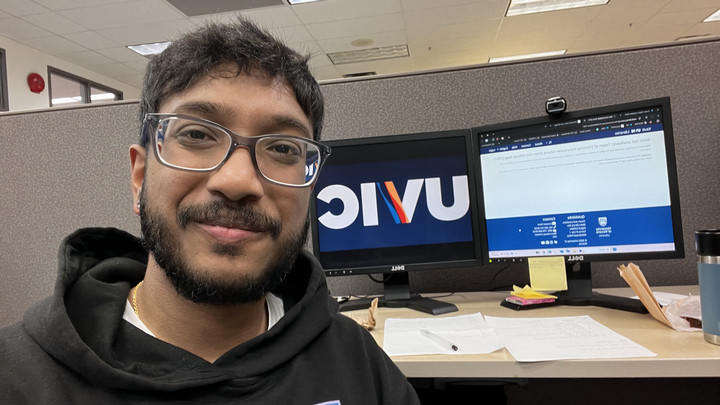Putting research to work with co-op
September 03, 2025

Two co-op work terms helped Sangeev Thevananthan bring the research skills he’s developed as a Master’s student in English with a concentration in Cultural, Social and Political Thought into work experiences that he hopes will build the foundation for a career in libraries.
In his second year as an undergraduate student at the University of Guelph, Thevananthan switched his program to English. “I liked reading challenging books and analyzing them through historical and theoretical lenses. I knew I wanted to attend graduate school by my final year of studies,” he says. By that time, he had developed an interest in ecocriticism, and was looking into graduate programs with concentrations in theoretical analysis—that led him to UVic, where his research explores ecocriticism and posthumanism in science fiction, particularly the work of Ursula K. Le Guin.
Thevananthan’s love for literary theory was nourished during a seminar on multi-narratives, taught by Dr. Corinne Bancroft—he calls it “my most memorable seminar in graduate school.” Each week, students covered a wide range of literary criticism about a text, building a foundation of knowledge about narrative theory.
After balancing co-op work terms with graduate study, Thevananthan encourages other graduate students to consider the co-op program. “I think even as graduate students, a work term can be a great break between academic terms where you can learn about what you’d like to pursue after your program,” he says.
As a graduate student, Thevananthan found co-op roles that tapped into his research skills and translated them into libraries and museums. As a museum assistant with the Oshawa Museum in Ontario, he renewed a digital exhibit about the history of industry in Oshawa, as well as researching and writing for an upcoming exhibit renewal about the history of the Ancestral Huron-Wendat.
“The skills I built in graduate study, especially research and writing, were very helpful in the projects I contributed to over my co-op terms, because I was consulting a variety of sources and aggregating information,” says Thevananthan. “The presentation skills that I developed through graduate study and teaching also transferred over, as I often had to present my findings and communicate them to the rest of my team.”
His second co-op placement at the McPherson Library as a linked data intern integrated digital skills with research: Thevananthan contributed to a research project on the use of Digital Object Identifiers (DOIs) in libraries and research institutions, and worked on metadata reconciliation for a digital library collection of wildlife photography.
“From the projects I got to work on, helping author an academic paper is one that I’m the most proud of,” he reflects: his work on the DOI project involved researching, writing and analyzing data that eventually became a paper in library sciences, which is currently pending peer review.
Now, he’s considering a few paths that build on these accomplishments: further study in Library and Information Science, or, alternately, communications or policy work. “My co-op experience has built a solid set of skills that I can transfer to a variety of positions outside of academia,” he says.
